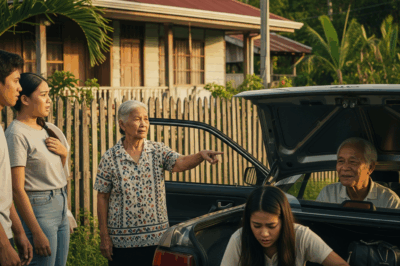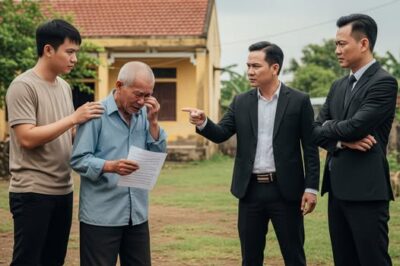It began as a punchline. It ended as a political storm.
On what should have been another glittering night of music and laughter at the Super Divas concert in Araneta Coliseum, comedian and television icon Vice Ganda dropped a joke that would ignite outrage in the halls of Davao City’s political power. The quip—a parody about “jetski holidays” clearly referencing former President Rodrigo Duterte’s famous 2016 campaign promise—has now been formally condemned by the Davao City Council, sparking heated national debate over the limits of comedy and the sanctity of political respect.
The Joke That Started It All
During a light-hearted segment, Vice Ganda launched into a satirical sales pitch:
“Nothing beats a jet ski holiday—ride now from Manila to the West Philippine Sea via jet ski! Get unlimited water bombing from Chinese vessels and a free trip to The Hague by the ICC. Promo applies to DDS only. Pinklawans and BBMs are prohibited.”
The audience roared. But the joke didn’t stop there. Vice slipped into an imitation of Duterte, complete with his signature gravelly tone, and delivered a faux warning:
“Huwag n’yo akong subukan, mga p***a ia n’yo.”
For many, it was classic Vice—sharp, playful, and unapologetic. For others, it was a line crossed.
City Council Moves to Condemn
Within days, the Davao City Council passed a resolution condemning the joke as “satirical and derogatory,” accusing Vice Ganda of disrespecting not just the former President, but the city itself. Councilor Danilo Dayanghirang, who authored the resolution, argued that Duterte was “a son of Davao” whose decades of leadership transformed the city into a model of governance and security.
“This was not harmless comedy,” Dayanghirang declared. “It was an insult to a man who brought honor to our city and to the people who respect him.”
The resolution stopped short of declaring Vice Ganda persona non grata, but it carried the full weight of official censure. The message was clear: Davao City was not laughing.
Fact vs. Fiction: The Persona Non Grata Rumor
Almost immediately, social media buzzed with claims that Vice Ganda had been banned from Davao entirely. Memes and posts claimed she had been formally labeled persona non grata. But fact-checkers quickly debunked the rumor. The supposed “official document” was a satirical fake, complete with hidden acrostics spelling “SATIRE” and lacking any real resolution numbers or seals.
The truth: while condemned, Vice Ganda remains free to visit Davao—at least in an official sense.
Mixed Reactions from the Duterte Camp
The backlash wasn’t unanimous within Duterte’s own circle. Rigo Duterte, the former President’s grandson and a city councilor himself, dismissed calls for a ban. He called the viral outrage “cheap insults made for clout” but stopped short of supporting any form of blacklisting.
Meanwhile, Claire Castro, speaking on behalf of the Presidential Communications Office, took a more tempered stance. She noted that the joke was built on a well-known meme and echoed comments Duterte himself once made. “If the former President could laugh at himself, perhaps others could, too,” she suggested.
Public Opinion: Divided and Loud
On the streets of Davao, in Manila coffee shops, and across the wild currents of social media, the nation seemed split.
Supporters of Vice Ganda defended her right to satire, arguing that comedy has always served as a mirror to power. “If politicians can’t take a joke, maybe they shouldn’t be in politics,” one viral tweet read.
Critics, however, saw the performance as a deliberate affront to a man revered by many in Mindanao. “There’s a difference between making people laugh and making fun of someone’s legacy,” said one Davaoeño, echoing a sentiment widely shared in the city.
Comedy vs. Respect: A Cultural Fault Line
This latest incident highlights an enduring tension in Philippine society—how to balance freedom of expression with cultural and political sensitivities. In Manila’s entertainment circles, sharp-edged satire is a badge of honor. In Davao, where Duterte’s influence runs deep, such barbs can feel like an attack on local identity.
Vice Ganda, known for pushing boundaries, is no stranger to controversy. Her brand of humor thrives on exaggeration and playful provocation, but it has also sparked repeated clashes with public figures and institutions. This time, however, the collision is more than personal—it’s political.
Beyond the Laughs
The “jetski holiday” joke wasn’t just about Duterte. It tapped into a larger national narrative—the Philippines’ fraught territorial disputes in the West Philippine Sea, Duterte’s complicated relationship with China, and his critics’ long-standing jabs about his unfulfilled campaign promise to plant the Philippine flag on disputed islands.
By packaging these political threads into a quick punchline, Vice Ganda reignited discussions that have been simmering for years. Some say that’s the very job of satire. Others insist it’s an irresponsible misuse of influence.
Where Do We Go From Here?
Whether this moment becomes a footnote in Vice Ganda’s career or a turning point for political comedy in the Philippines remains to be seen. What’s certain is that it has exposed the fine line entertainers walk when their humor intersects with politics.
The Davao City Council’s condemnation is a reminder that in certain corners of the country, humor about political icons is not taken lightly. For Vice Ganda, the challenge now is whether to double down on her unapologetic style or temper her punchlines in the face of mounting political scrutiny.
One thing’s undeniable: the jetski joke has already traveled far beyond the stage—and it isn’t running out of fuel anytime soon.
News
My husband and I saved up to buy a car, but the first time we went back to his hometown, I was fuming when all his relatives, their feet still covered in mud, climbed right into our brand-new car. My father-in-law even told me to ride a motorbike behind so my husband could drive his uncles and aunts. I was boiling inside, so I put something in the car’s trunk… and five minutes later, everyone scrambled out immediately because…
2 husband and wife saved money to buy a car, returned to my hometown for the first time; When my…
After we finished building our house, my sister-in-law insisted on staying over—and even brought along my mother-in-law and my husband’s aunt to eat and hang around all day. I got so mad that I cleared out the fridge, left only one thing inside—and exactly three days later…
After building the house, my brother-in-law insisted on staying and even dragged his mother-in-law and sister-in-law to eat and drink…
Despite marrying a man older than my father, every night after the wedding I felt fulfilled by something “even young men couldn’t do” — but three months later, my husband was suddenly bedridden… and when I opened the wardrobe, everything fell out, and what I saw left me frozen…
Despite getting married older than my father’s age… The day I openly fell in love with him – a man…
The father gave a debt note of ₱2,160,000 to his 3 sons to ask for help, but everyone refused, only the youngest child dared to shoulder it and then took him back to take care of it, exactly a year later, the youngest boy suddenly received an a4 paper
Dad gave a debt note of ₱2,160,000 to 3 sons… The day his father returned from the hospital, he…
Near giving birth, my wife went shopping for her child alone, unexpectedly seeing her husband taking her to the market, she only sent a message that made him stand on the spot…
Near giving birth, my wife went shopping for her child alone, unexpectedly seeing her husband taking her to the market,…
When I was shopping for clothes and met my ex-wife, she suddenly leaned over my ear and whispered something. I was shocked and immediately took my new wife to the hospital for a checkup, but I got a shocking news…
We bumped into each other again at a mall in Mumbai. I was shopping hand in hand with my new…
End of content
No more pages to load













